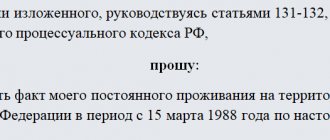Establishing the fact of kinship for inheritance
In order to issue a certificate of the right to inheritance according to the law, a notary, in accordance with Article 72 of the “Fundamentals of the Legislation of the Russian Federation on Notaries,” must check the death of the testator, the time and place of opening of the inheritance, the composition of the inheritance and its location.
The notary also determines the circle of heirs according to the law. To do this, it is necessary to check the relationship between the testator and the persons who submitted applications for inheritance, since the presence and degree of relationship with the testator is the basis for calling them to inherit by law.
Legal assistance in establishing family relations with the testator. Tel.+7 Telephone consultation
However, legal heirs may have a problem associated with the inability to confirm their relationship with the testator due to reasons such as:
- Loss of documents confirming family ties
- Impossibility of document recovery
- Inconsistencies and discrepancies in the documents
If the documents submitted to the notary lack at least one certificate, without which it is impossible to trace the chain of relationship between the deceased testator and the person who expressed the will to accept the inheritance (birth certificate, marriage/divorce, change of surname, etc.), such person cannot be called upon by a notary to inherit by law.
In practice, there are cases when, due to discrepancies and inconsistencies in documents, it is formally impossible to trace relationships even between very close relatives - siblings, parents and children. Such inconsistencies may have various reasons, for example, the presence of typos or spelling errors when indicating last names, first names or patronymics in documents, and other inaccuracies.
Establishing the fact of kinship in court is especially typical for cases of inheritance by persons included in the second, third and subsequent lines of inheritance, for example, great-nephews, aunts, uncles, cousins, brothers or their children, etc., or when the testator died at a fairly advanced age, and the discrepancies in the documents cannot be eliminated due to the failure to preserve the relevant archival data.
There are often cases when it is impossible to restore lost documents also due to failure to preserve vital records in the registry office archives and state archives.
So, in order to obtain the right to inheritance by law, it is necessary to confirm the fact and degree of relationship with the deceased . Without this, the notary will not include the applicant in the circle of legal heirs. When accepting an application from a person whose relationship with the testator cannot be traced, the notary explains to the applicant about the need to confirm the relationship in order to be included in the number of heirs.
There are two ways to confirm relationship with the testator:
- Obtaining duplicate certificates from civil registry offices (archives)
- Establishment of family relations with a deceased testator in court
The second (judicial) method can be used only if it is impossible to confirm the fact of kinship in another (extrajudicial) way , i.e. if it is impossible to restore lost documents. If the documents can be obtained independently, there is no need to go to court; moreover, the court will not accept such a statement, and the recovered documents must be presented directly to the notary to confirm the relationship with the deceased.
After the heir’s application to establish the fact of relationship with the testator is accepted for court proceedings, the notary who opened the inheritance case, as an interested person, is notified of the consideration of such a civil case.
According to the provisions of Article 41 of the “Fundamentals of the Legislation of the Russian Federation on Notaries,” this is the basis for the notary to suspend notarial actions within the framework of the inheritance case opened by him until the court makes a decision in the case establishing the fact of the applicant’s relationship with the testator.
If the relationship is not established in court and the application is rejected by the court, the notary will refuse to issue a certificate of inheritance to this person due to failure to confirm his status as the legal heir of the deceased.
Important: It is necessary to remember that even if the applicant for the inheritance does not have a documented relationship with the testator, the notary is obliged to register an application for acceptance of the inheritance by law and open an inheritance case.
The most important thing is to contact a notary with an application within the 6-month period from the date of death of the testator. Although there are no legal grounds for refusing to accept an application in this case, in practice there are often cases when notaries verbally refuse to accept an application if the relationship is not confirmed.
If a notary orally refuses to accept an application to accept an inheritance according to the law, citing non-confirmation of relationship with the testator,
request a reasoned written refusal . If the dialogue with a notary does not lead to the desired result, it is recommended to send him your application by mail (necessarily with a list of attachments), having previously certified your signature in the application from another notary .
In this case, the notary must either:
- accept the application and start an inheritance case;
- within 10 days, provide a written reasoned refusal to open an inheritance case.
Thus, the fact of timely contacting a notary with an application to accept the inheritance will be recorded, which will subsequently relieve the heir from the need to restore the deadline for accepting the inheritance if the process of establishing the fact of kinship in court is delayed and goes beyond the 6-month period for accepting the inheritance.
An unlawful refusal by a notary can be appealed in court in accordance with Chapter 25 of the Code of Civil Procedure of the Russian Federation. To file a complaint, it is advisable to contact a practicing lawyer who will competently defend your rights in court.
Lawyer on inheritance issues in St. Petersburg. Tel.+7 (812) 989-47-47 Telephone consultation
Summarizing the above, let us outline the main aspects:
- If it is impossible to directly document the relationship with the deceased testator, establishing the fact of family relations with him is possible only in court, since legally significant facts, including the establishment of family relations, are established exclusively by the court in a special proceeding
- The absence of documents confirming relationship with the deceased testator is not a basis for a notary’s refusal to accept an application for acceptance of an inheritance; such a refusal will be unlawful and can be appealed in court
- The court's acceptance of the heir's application to establish the fact of kinship with the deceased testator is the basis for suspending notarial actions in the inheritance case until the court makes a decision in the case of establishing the fact of kinship.
Why is it important to determine the fact and degree of relationship during inheritance?
As is known, on the territory of the Russian Federation, inheritance can be transferred by law or by will. In the first case, establishing the highest degree of family ties will allow you to win the largest part of the inheritance. So, for example, in the case of illegitimate children of the testator (if there are any), timely establishment of a relationship with the deceased will allow them to be considered heirs of the first priority. When registering an inheritance under a will, the heirs will need to establish the fact of relationship, for example, if the initials in a document or identity card do not match. Proof of kinship is important, both when registering an inheritance under a will, and in the case of inheritance by law, which involves accepting the inheritance in the order of priority.
Grounds for establishing the fact of family relations
- The court establishes only facts of legal significance, i.e. giving rise to the emergence, change or termination of rights. Establishing the fact of kinship without a specific purpose is impossible
- Relationship can be established by a court only if it is impossible to establish it in any other extrajudicial way, i.e. if it is impossible to obtain/restore the necessary documents
Now more about this.
The court establishes facts of legal significance, that is, those facts as a result of which a citizen or organization acquires, changes or terminates personal or property rights (Article 264 of the Code of Civil Procedure of the Russian Federation).
In other words, to establish a fact by the court, a certain goal is necessary , the achievement of which is impossible without establishing this fact. This makes this or that fact legally significant.
In particular, the emergence of a citizen’s inheritance rights in relation to the property of the testator depends on establishing the fact of kinship with the deceased, i.e. Without confirming the relationship with the deceased, it is impossible to receive his inheritance .
From this we can conclude that it is impossible to go to court to establish the fact of a family relationship without any reason, just like that, since if this fact does not give rise to specific consequences for the applicant, it has no legal significance.
When speaking about the fact of kinship, the legislator does not imply only blood relationship, but this also applies to acquired kinship between people. The purpose of establishing the fact of kinship is for a person to accept the inheritance, and such a person can be not only a person who has a blood relationship with the deceased, but also one who does not have blood ties with him.
For example, this could be a stepfather, stepmother, stepson, stepdaughter - i.e. those persons who are not related by blood to the testator, nevertheless, are included in the circle of his heirs by law in the corresponding lines of inheritance. And in their case, it may also be necessary to establish the fact of relationship in court.
As mentioned above, a prerequisite for judicial establishment of the fact of relationship is the impossibility of obtaining the document necessary to confirm the relationship in any other way. After all, any lost certificate issued on the basis of a civil status record can, in the vast majority of cases, be restored, i.e. simply obtain a duplicate certificate from the civil registry office that originally issued this document.
Difficulties may arise when the registry office that issued the certificate is located in a remote and inaccessible area, but even in this case, obtaining the document independently is possible.
In order to demand in court the establishment of a fact of legal significance, the judge will need to submit documents confirming the application to the relevant authorities in order to obtain/restore the necessary documents, as well as responses from these institutions indicating the reasons for the impossibility of issuing such documents.
Lawyer (advocate) for establishing family relationships in court. Tel.+7 (812) 989-47-47 Telephone consultation
Out-of-court method of resolving the issue
Most often, the establishment of facts occurs in court. However, the law provides for one exception. If there are several applicants for assets and one of them cannot provide evidence of the relationships that are required to call for inheritance, then he can be included in the list of heirs with the consent of other participants (Article 72 of the Law on Notaries). But in practice, this happens infrequently - rarely does anyone want to give the inheritance share to a newly announced candidate.
How to prove relationship in court
So, if the heir was unable to collect the documents necessary to confirm the relationship, it is necessary to apply to the court with an application to establish the fact of the relationship in accordance with paragraph 1 of part 2 of Article 264 of the Code of Civil Procedure of the Russian Federation.
If a notary can establish the relationship of the heir with the deceased testator only on the basis of certificates of state registration of acts of civil status, then for judicial establishment any written evidence that directly or indirectly confirms the relationship with the testator can be presented
It can be:
- Archival certificates from civil registry offices or from departmental and historical state archives, extracts from civil status acts
- Certificates: birth, registration/divorce, death, change of surname, establishment of paternity, etc.
- Extracts from house books
- Certificates from the maternity hospital, other medical certificates
- Letters and greeting cards, personal correspondence, state awards
- Photos from the family archive
- Any other documents through which the relationship between the applicant and the testator can be traced
One of the important pieces of evidence in court is witness testimony . As a rule, relatives, close family friends, neighbors act as witnesses, but they can also be any other adult persons who can confirm the required fact.
The more evidence in court, the better, and you should not limit yourself to indirect written evidence; this may not be enough for the court to establish a legally significant fact. The court evaluates all the evidence presented in its entirety.
In some cases, to confirm the relationship with the testator, the results of a genetic study (DNA analysis) . This method is usually used when it is necessary to confirm the blood relationship of immediate relatives, for example mother and children, sisters and brothers, i.e. when inheriting by heirs of the first and second orders. However, it is not always possible to conduct genomic examination.
Procedure for confirming relationship
To confirm the family relationship with the deceased testator, the heir must collect all the necessary documentation and contact a notary, where the collected evidence will be assessed. If any documents are missing, the heir will be asked to contact the registry office to request the necessary documents. You should contact the registry office where, according to the heir, the specified documents may be located. The heir can apply to the registry office in person with an application for the issuance of duplicate documents or send such an application by mail if the registry office department is located in another city. If the necessary information is available, the registry office sends a notification to the place of residence of the heir with an offer to obtain duplicate documents by pre-paying the state fee; if not, the applicant is also notified about this in writing. If the measures taken by the applicant do not produce a positive result and there is no information to confirm the relationship, it becomes necessary to confirm the relationship through the court.
The procedure for establishing the fact of relationship in court. Procedure for filing an application with the court
- An application to establish the fact of a family relationship is considered by the district court at the applicant’s place of residence (Article 266 of the Code of Civil Procedure of the Russian Federation)
- The application is considered according to the rules of Article 264 of the Code of Civil Procedure of the Russian Federation in accordance with special proceedings
- When filing an application with the court, a state fee is paid
- The notary in charge of the inheritance case is indicated as an interested party in the case
- If other heirs , they are involved in the case as interested parties , since establishing the applicant’s relationship with the testator may directly affect the interests of these persons
Attention: If, when considering the application, it is established that there is a dispute about the right between the heirs regarding the inherited property, the court leaves the application without consideration and explains to the applicant and other interested parties the right to apply to the court with a statement of claim to resolve the dispute. Consequently, if the circle of heirs is known, they must be immediately indicated as interested parties in the case.
DNA paternity test
Previously, only blood from a vein was used to take a DNA test to determine paternity. Now the range of methods for conducting genetic examinations has expanded significantly. A DNA paternity test can be carried out using blood, saliva, hair, nails, etc. We divide biological samples into two categories: standard and non-standard ( special
)
.
Our standard samples include cells from the oral mucosa (buccal epithelium) collected using sticks (“smears”) with a Dacron
Dacron
-tipped swabs
,
Rayon
-
tipped swabs
, and
Polyester
-
tipped swabs
are the most common type of samples that are processed by us. All other samples are considered non-standard (special).
The method of establishing paternity guarantees the accuracy of the results obtained while observing the rules for collecting and storing biomaterial. Negative conclusion when determining paternity “ is not the father”
" -
100%
, positive conclusion "
is the father
" -
99.99%
.
Cost of establishing kinship using standard samples (cotton swabs):
| Type of study | Cost of genetic testing | |
| "Medical Genomics" (Russia) Number of markers 20 Duration: 5-7 working days | Medical Genomics Ltd. (Great Britain) Number of markers 16 Duration: 12-14 working days | |
| DNA test - establishing relationship Alleged father and child Alleged mother and child Alleged brother and sister | 13 500 R. | 22 000 R. |
| Additional child/parent | 6,500 rub. | 12,000 rub. |
DNA test to establish maternity
Genetic determination of motherhood
Genetic study to establish maternity
- a test to determine
the biological relationship between mother
and
child
.
Laboratory Medical Genomics
conducts
DNA
to analyze
16
,
20
or
24 STR genetic markers
.
The research is carried out by two independent groups of specialists. the DNA
tests performed are then verified.
The accuracy of the result “ is a mother
” is at least
99.9999%
, the accuracy of the result “
is not a mother
” is
100%
.
For DNA analysis
our laboratory uses a saliva swab taken from the inside of the cheek of study participants.
This method is absolutely painless and does not require much time. A saliva smear
is taken using
a cotton swab yourself
or by a medical professional.
Every DNA test
requires a saliva sample
from the intended mother
and
baby
.
DNA
samples from
the father
or other
alleged mother
.
Cost of maternity determination service (cost of DNA analysis):
| Type of study ordered | "Medical Genomics" (Russia) Execution time is 5-7 working days. Number of markers | Medical Genomics Ltd. (Great Britain) Execution time is 12-14 working days. Number of markers | ||
| 20 | 24 | 16 | 24 | |
| ESTABLISHMENT OF MOTHERHOOD | ||||
| Alleged mother and child | RUB 13,500 | 20,000 rub. | 22,000 rub. | 26,000 rub. |
| Additional child/parent | 6,500 rub. | 11,000 rub. | 12,000 rub. | RUB 13,500 |
In order to ensure the correct and uniform application by courts of general jurisdiction of the Donetsk People's Republic of legislation on establishing facts of legal significance, the Plenum of the Supreme Court of the Donetsk People's Republic
DECIDES:
provide the courts with the following explanations:
1. Draw the attention of the courts to the fact that, according to Articles 234, 256 of the Civil Procedure Code of Ukraine (Civil Procedural Code of Ukraine), cases of establishing facts are considered in special proceedings if:
– according to the law, such facts give rise to legal consequences, that is, the emergence, change or termination of personal or property rights of citizens depends on them;
– the current legislation does not provide for a different procedure for their establishment;
– the applicant has no other opportunity to receive or restore a lost or destroyed document that certifies a fact of legal significance;
– the establishment of a fact is not associated with the subsequent resolution of a dispute about law.
The list of facts established by the court given in Article 256 of the Code of Civil Procedure of Ukraine is not exhaustive. If the specified conditions are met, the court may establish other facts of legal significance, for example, facts of recognition of paternity in relation to children born before October 1, 1968; paternity (Article 130 of the IC of Ukraine); paternity registration; the fact of acceptance of the inheritance (Civil Code of the Ukrainian SSR as amended in 1963); fact of residence in the territory of the former Donetsk region of Ukraine as of April 7, 2014, etc.
2. When deciding on the jurisdiction of a case, courts have the right to take into account the norms of legislative acts that provide for an extrajudicial procedure for establishing certain facts or determine facts that in these legal relations can be confirmed by a court decision. In particular:
– according to the Procedure for confirming existing work experience for the purpose of pensions in the absence of a work book or relevant entries in it, approved by Resolution of the Cabinet of Ministers of Ukraine dated August 12, 1993 No. 637, if the documents have not been preserved, confirmation of work experience is carried out by the district (city) departments of the pension fund for based on witness testimony; in other cases, the presence of a certain length of service is determined in the manner prescribed by the legislation regulating the legal relations with which the need to establish this length of service is associated;
– in accordance with the Temporary Procedure for confirming periods of work that are counted towards seniority for the purpose of granting a pension on preferential terms or for long service, approved by order of the Chairman of the Pension Fund of the Donetsk People's Republic dated May 25, 2015 No. 35, registered with the Ministry of Justice of the Donetsk People's Republic on June 8, 2015 year under registration No. 204, which defines the mechanism for confirming periods of work that are counted towards the length of service for the assignment of a pension on preferential terms or for length of service established for a separate category of citizens in the event of liquidation of an enterprise, institution and organization without identifying a successor, confirmation of the specified length of service is carried out by a commission , created under the Pension Fund of the Donetsk People's Republic.
The courts cannot consider applications to establish the facts of belonging to persons who suffered as a result of the accident at the Chernobyl nuclear power plant, veterans or disabled war veterans, documents on military service, being at the front, in partisan detachments, receiving wounds and shell shock while performing military service duties; on establishing the causes and degree of disability; disability group and time of its onset; about graduating from an educational institution and receiving appropriate education; receiving government awards. The refusal of the relevant body to establish such a fact may be appealed by the interested party to the court in the manner prescribed by Chapter 31-A of the Code of Civil Procedure of Ukraine.
3. When deciding the issue of opening proceedings on applications for establishing facts of legal significance, the courts must take into account that these statements must comply with both the general rules regarding the content and form of the statement of claim established by Article 119 of the Code of Civil Procedure of Ukraine, and the requirements for its content provided for Article 258 of the Code of Civil Procedure of Ukraine. If the application does not indicate what specific fact the applicant is asking to establish, for what reasons it is impossible to obtain or restore a document certifying this fact, what evidence confirms this fact, or certificates about the impossibility of obtaining or restoring the necessary documents are not attached to the application, the judge, in accordance with Article 121 of the Code of Civil Procedure of Ukraine issues a ruling to leave the application without progress and provides the applicant with a period to eliminate deficiencies. If these instructions are not followed, the application is considered not submitted and is returned to the applicant, about which the judge makes a reasoned decision.
In each case, the judge is obliged to check the jurisdiction of the given application to the court. If, according to the law, the application is not subject to judicial review (an extrajudicial procedure for establishing the fact is provided), the judge, with a reasoned ruling, refuses to open proceedings in the case, and if the proceedings have already been opened, he terminates the proceedings.
The judge refuses to open proceedings in the case if a dispute about the law is discerned from the application for establishing a fact of legal significance, and if a dispute about the law is established during the consideration of the case, he leaves the application without consideration and explains to interested parties that they have the right to file a claim on a universal basis.
If the establishment of a fact does not have legal significance, the judge, with a reasoned ruling, refuses to open proceedings in the case, and if the proceedings in the case have already been opened, he terminates the proceedings.
4. An application to establish facts of legal significance may be submitted to the court by persons directly interested in this, as well as other legal entities and individuals, government bodies that, by law, have the right to apply to the court in the interests of other persons, as well as the prosecutor.
When one person submits applications to establish several facts of legal significance, all these applications, in accordance with the rules of Article 126 of the Code of Civil Procedure of Ukraine, can be combined and considered by the court in one proceeding. Other requirements cannot be considered in proceedings to establish facts of legal significance.
5. To ensure correct and timely consideration of cases on establishing facts of legal significance, the judge may, in accordance with Article 130 of the Code of Civil Procedure of Ukraine, hold a preliminary court hearing, in particular, find out which individuals and legal entities, government bodies may be interested in resolving this cases and are subject to summons to the court hearing, if necessary, invite the applicant and interested parties to provide additional evidence in support of the stated claims or objections to them, resolve the issue of requesting evidence, calling witnesses. A preliminary hearing is not mandatory. The question of whether it is necessary is resolved by the judge during the opening of the proceedings.
6. Courts should keep in mind that cases of establishing facts of legal significance must be considered in compliance with the general rules established by the Code of Civil Procedure of Ukraine, with the exception of provisions on adversarial proceedings and the limits of judicial proceedings (Part 2 of Article 235 of the Code of Civil Procedure of Ukraine), with the participation of applicants and interested parties and their representatives.
Applicants and interested parties involved in the case, their representatives have the right, respectively, to provide evidence to confirm the validity or unfoundedness of the statement of fact being considered by the court, to take part in the investigation of the circumstances of the case, to appeal decisions and rulings, and to perform other procedural actions provided for in Articles 27, 31 Civil Procedure Code of Ukraine.
When considering cases, the court is obliged to explain to the persons involved in the case their rights and obligations, to assist in the implementation and protection of the rights, freedoms or interests of individuals or legal entities guaranteed by the Constitution of the Donetsk People's Republic and laws, to take measures to comprehensively, completely and objectively clarify the circumstances of the case.
In order to clarify the circumstances of the case, the court, in accordance with Part 2 of Article 235 of the Code of Civil Procedure of Ukraine, may, on its own initiative, request the necessary evidence.
7. The fact of family relations between individuals (clause 1 of part 1 of Article 256 of the Code of Civil Procedure of Ukraine) is established in court when this fact directly gives rise to legal consequences. For example, if confirmation of such a fact is necessary for the applicant to obtain a certificate of inheritance from a notary, to formalize the right to a pension in connection with the loss of a breadwinner.
At the same time, applications to establish the fact of family relations are not subject to consideration in special proceedings if the applicant submits an application in order to confirm in the future his right to residential premises or exchange of residential premises. In case of refusal to satisfy the requirements for recognition of the right to residential space or to exchange residential premises, the interested person has the right to apply to the court with a corresponding claim.
8. Courts should keep in mind that, on the basis of paragraph 2 of part 1 of Article 256 of the Code of Civil Procedure of Ukraine, establishing the fact that a person is dependent on the deceased is important for receiving an inheritance, assigning a pension, processing insurance payments or compensation for harm. The applicant’s receipt of earnings, pensions, scholarships, or other income is not a basis for refusing to establish the fact of being a dependent when the court establishes that the main and permanent source of livelihood for the applicant was assistance from the person who provided him with maintenance.
A certificate issued by the relevant authority stating that, according to its data, the person was not a dependent of the deceased, does not exclude the possibility of establishing in court the fact of being a dependent. Such a certificate is assessed by the court according to the rules of Article 57 of the Code of Civil Procedure of Ukraine.
When resolving applications to establish the fact of being a dependent, it is necessary to take into account that:
– as a general rule, the right to a pension in connection with the loss of a breadwinner is given to disabled family members of the deceased breadwinner who were dependent on him (Article 36 of the Law of Ukraine “On Compulsory State Pension Insurance”);
– to establish the fact of being a dependent in order to formalize the right to inheritance, it is necessary that the dependent be a minor or a disabled person who was not a member of the testator’s family, and was dependent on him for at least five years (Part 2 of Article 1265 of the Civil Code of Ukraine);
– to establish the fact of being dependent upon compensation for damage in the event of the loss of a breadwinner, it does not matter whether the disabled dependent was in a family or marital relationship with the breadwinner (Articles 1200, 1205, 1207 of the Civil Code of Ukraine).
9. When applying paragraph 3 of part 1 of Article 256 of the Code of Civil Procedure of Ukraine, which provides for the establishment of the fact of injury, if this is necessary for assigning a pension or receiving assistance under compulsory state social insurance, the courts should keep in mind that cases on the establishment of such facts are not considered in accordance with the procedure special production. This category of cases is subject to consideration in the procedure of claim proceedings.
10. According to paragraph 4 of Article 256 of the Code of Civil Procedure of Ukraine, courts can establish the facts of marriage registration, divorce and adoption. Such facts are subject to establishment in a special proceeding if the civil registration authorities have not preserved the corresponding record (lack of an archive or corresponding registration book, as well as if there is a book, but there is no entry in it) or its restoration is refused, or it may be restored only on the basis of a court decision establishing the fact of registration of a civil status act. The fact of divorce is also subject to establishment in a special proceeding if the court refuses to restore the lost judicial proceedings in the case of divorce when the court decision was made after July 1, 2010.
In addition, spouses or each of them can apply to establish the fact of marriage registration. If the application is submitted by only one of the spouses, the second of them is involved in the case as an interested party.
The judge does not have the right to refuse to open proceedings, and the court does not have the right to terminate the proceedings on the grounds that the civil registration authorities refused to restore the record of registration of the act due to the absence of this record in the registration books of the relevant records that have been preserved.
11. According to paragraph 5 of part 1 of Article 256 of the Code of Civil Procedure of Ukraine, the fact of residence of a man and woman without registration of marriage in the same family must be established in a special proceeding.
Article 3 of the Family Code of Ukraine stipulates that a family consists of persons who live together, are connected by a common life, and have mutual rights and obligations. Establishing the fact of cohabitation is important for protecting the material interests of persons who live together, since Article 74 of the Family Code of Ukraine provides that if a woman and a man live in the same family, but are not married to each other, the property acquired by them during their common residence belongs to them on the right of common joint ownership, unless otherwise established by a written agreement between them. The fact that a man and a woman live in the same family without registering their marriage cannot be established if both parties or one of the parties is in another registered marriage.
12. When considering cases to establish, in accordance with paragraph 6 of part 1 of Article 256 of the Code of Civil Procedure of Ukraine, the fact that title documents belong to a person whose surname, first name, patronymic, place and time of birth indicated in the document do not coincide with the name, patronymic, surname, place and the time of birth of this person indicated in the birth certificate or in the passport (including the fact of ownership of the title document in which errors were made in the surname, first name, patronymic, or initials are indicated instead of the first and patronymic), the court must invite the applicant to provide evidence of that the title document belongs to him and that the organization that issued the document does not have the opportunity to make appropriate corrections to it. At the same time, the above procedure does not apply if corrections in such documents are not properly specified or their details are not clearly expressed due to long-term use, improper storage, etc., which is the basis for deciding the issue of establishing the fact referred to in the document, in in accordance with current legislation.
Applications to establish the fact that a person belongs to a sentence or court decision, a ticket for membership in an association of citizens, a military ID, a certificate for an order or medal, a passport, certificates issued by civil registration authorities, and other identification documents are not subject to consideration in under special proceedings, since these issues are resolved by the authority that issued the document. The courts also do not establish the identity of a citizen with the person depicted in the photograph. At the same time, on the basis of paragraph 6 of part 1 of Article 256 of the Code of Civil Procedure of Ukraine, the court can establish the fact that a person owns documents that do not relate to identification, for example, certificates of injury or stay in hospital due to injury, reports from military units, military registration and enlistment offices and other bodies military department about death or missing in action due to wartime circumstances, as well as a will, insurance certificate (policy), savings book, work book, other document on work experience.
13. By way of special proceedings, the facts of the birth of a person at a certain time and the death of a person at a certain time are also established in the event that it is impossible for the state registration body to register acts of civil status of the facts of birth and death, as well as the death of a person who went missing under circumstances that threatened him death or give grounds to consider him dead from this accident due to an emergency situation of a man-made or natural nature (clauses 7-9 of part 1 of article 256 of the Code of Civil Procedure of Ukraine).
Proceedings on applications to establish these facts are opened, and cases are considered by the courts, subject to the applicants providing documents confirming the refusal of the civil registration authorities to register the event of birth or death of a person. The applicant is obliged to substantiate his application with references to evidence reliably indicating the birth or death of a person at a certain time and under certain circumstances.
In contrast to the fact of the death of a person, which is established by the court, subject to confirmation by evidence that this event took place at a certain time and under certain circumstances, a citizen can be declared dead by the court if the circumstances specified in Article 46 of the Civil Code of Ukraine are established. on the basis of which the court makes a probable assumption about the death of a citizen when there is no evidence of the fact of his death. In these cases, the court recognizes the day of death of a citizen declared dead as the day of his presumed death, if he went missing under circumstances that threatened death or there are grounds to assume his death from a certain accident; in other cases, the day of death is considered the day the decision entered into legal force court to declare a citizen dead.
14. Other facts may also be established in court on which the emergence, change or termination of personal or property rights of individuals depends, unless the law specifies a different procedure for their establishment.
Thus, the court considers applications to establish the fact of paternity in the event of the death of a person whom the applicant considers the father of the child, and decides them taking into account the circumstances provided for in Articles 125, 130 of the IC of Ukraine.
Applications to establish the fact of recognition of paternity in relation to a child born before October 1, 1968 are considered by the court in cases where the deceased recognized himself as the father of the child before this date.
Applications to establish the facts of paternity or recognition of paternity are considered by the court if a certain person is not indicated as the father of the child in the birth certificate (for example, according to Part 1 of Article 135 of the Family Code of Ukraine, the entry about the child’s father was made at the direction of the mother, who was not married) and may be filed by the mother, guardian or trustee of the child, or by the child himself after reaching the age of majority.
15. An application to establish the fact of acceptance of an inheritance in the absence of a dispute about the right to inheritance may be considered by the court in a special proceeding if the inheritance opened and was actually accepted by the heirs before January 1, 2004 (clause 1 of part 1 of Article 549 of the Civil Code of the Ukrainian SSR as amended in 1963 ). For civil relations that arose before January 1, 2004, the provisions of the Civil Code of Ukraine apply to those rights and obligations that arose or continue to exist after its entry into force.
To an inheritance that opened after July 1, 2003, and was not accepted by anyone before January 1, 2004, the provisions of the Civil Code of Ukraine apply, which do not provide for the establishment of the fact of acceptance of an inheritance. Moreover, in these cases, the court has the right to establish the facts: living with the testator in the same family for at least five years before the opening of the inheritance (Article 1264 of the Civil Code of Ukraine), the fact that the testator was dependent on a person who was not a member of his family (Part 2 of Article 1265 of the Civil Code of Ukraine ), permanent residence with the testator at the time of opening of the inheritance (Part 3 of Article 1268 of the Civil Code of Ukraine).
These applications are considered by the courts in a special proceeding in the absence of a dispute about the right to inheritance.
16. According to Part 4 of Article 277 of the Civil Code of Ukraine, if the person who disseminated false information is unknown, the individual whose rights have been violated may apply to the court to establish the fact that this information is untruthful and to refute it.
Judicial protection of dignity, honor and business reputation due to the dissemination of false information about a person is not excluded even if the person who disseminated such information is unknown (for example, when sending anonymous or pseudonymous letters or appeals, the death of an individual or the liquidation of a legal entity, dissemination of information on the Internet by a person who cannot be identified). In this case, the court has the right, at the request of the interested person, to establish the fact that this information is untrue and to refute it in a special proceeding.
If the circumstances referred to by the applicant are proven, the court only states the fact that the disseminated information is untrue and refutes it. In this case, the burden of proving the unreliability of the disseminated information rests with the applicant, who bears the costs associated with its refutation. Establishing such a fact is possible only if the person who disseminated false information is unknown.
If, during the consideration of the case in a special proceeding, the person who disseminated the information in relation to which the dispute arose becomes known, then, in accordance with the provisions of Part 6 of Article 235 of the Code of Civil Procedure of Ukraine, the court leaves the application without consideration and explains to interested persons that they have the right to file a claim against on general grounds.
17. The decision made in the case of establishing a fact of legal significance must comply with the requirements of Articles 212-215 of the Code of Civil Procedure of Ukraine. The court must also provide evidence in the decision to support the conclusion about the circumstances relevant to the resolution of the case, and when satisfying the application, clearly state the established fact.
A court decision to establish a fact of legal significance does not replace documents issued by the relevant authorities, but is only the basis for obtaining them.
According to Article 14 of the Code of Civil Procedure of Ukraine, in particular, a decision to establish a fact of legal significance, which has entered into legal force, is mandatory for bodies registering such facts or formalizing rights that arise in connection with a fact established by the court. If the fact of registration of a civil status act is established in court, the civil registration authority makes an appropriate entry on the basis of a court decision that has entered into legal force.
When making a decision in cases of establishing facts of legal significance, the courts must keep in mind that, in accordance with the peculiarities of special proceedings, the rules of Articles 84, 88 of the Code of Civil Procedure of Ukraine on reimbursement of costs for legal assistance and distribution of court costs in these cases do not apply.







